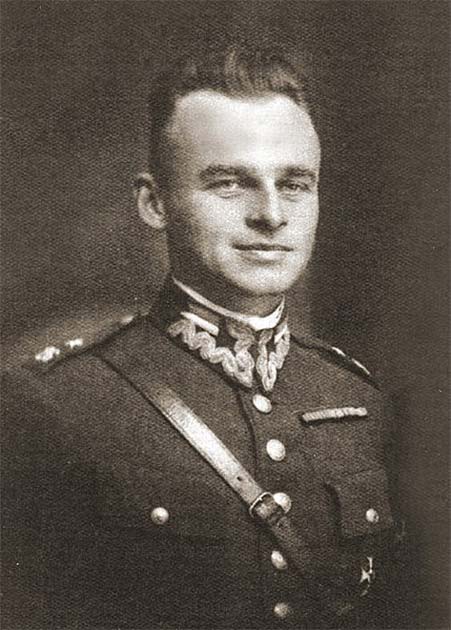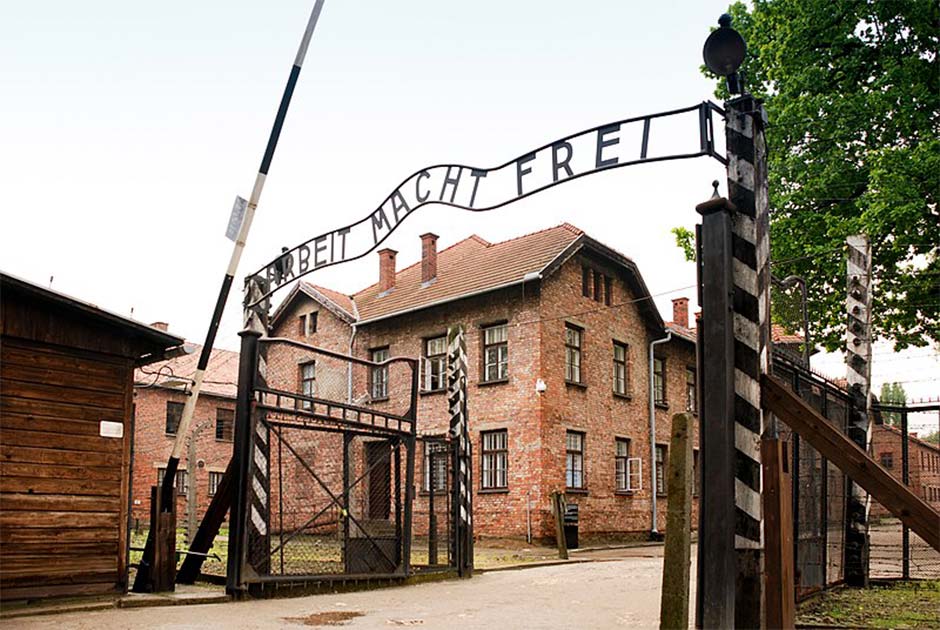Witold Pilecki, a Polish cavalry officer, stands as an unsung hero of World War II, his remarkable story intertwined with the notorious Auschwitz concentration camp. Pilecki’s daring decision to infiltrate Auschwitz reveals a tale of bravery in the face of unimaginable horror.
Even after WWII, Pilecki faced new threats and his end was a tragic one. Rather than being rewarded for his patriotism and sacrifice, he was persecuted for it. This is the story of one of WWII’s greatest heroes, from his humble beginnings to his countless heroics and his final sacrifice.
A Forgotten Hero
Pilecki was born on May 13, 1901, in the small town of Olonets in the republic of Karelia, part of Imperial Russia. While Pilecki had noble blood, his ancestors were Polish-speaking Lithuanian nobility, Pilecki himself was the son of a forest inspector, Julian Pilecki, and his wife, Ludwiki Osiecimska.
In 1910 Pilecki’s mother moved him and his siblings to Wilno to attend a Polish school. While there he joined the underground Polish Scouting and Guiding Association, or ZHP. In 1916 his mother then sent him to school in the Russian city of Oryol where he founded another ZHP chapter.
Pilecki was too young to serve during WWI but entered military service soon after it had ended. When the Russian Revolution broke out, he traveled to Wilno where he rejoined his ZHP friends as part of the Self-Defence of Lithuania and Belarus. He helped defend the city against Russian forces until it eventually fell in 1919.
He continued to fight behind Russian lines until joining Poland’s Volunteer Army later that year. During the Polish-Soviet War of 1919-1921, he earned distinction as a seasoned cavalry officer. His commitment to the defense of Poland persisted, leading him to actively engage in the resistance against the German occupation following the invasion of Poland in 1939.

Pilecki fought as a cavalry platoon commander during the Nazi invasion of Poland in 1939. After much fighting and losing many of his men, Pilecki’s division suffered a massive defeat on 22 September. Rather than follow his Command-in-Chief’s order to retreat to Romania, Pilecki and some of his men decided to fight an underground war in Poland.
On November 9 Pilecki and his old commander, Major Wiodarkiewicz, set up the Secret Polish Army (TAP) with the help of some other old comrades. For the next few months, things went well, and the TAP spread across Poland. However, the group would soon begin to tear itself apart, leading to Pilecki’s infiltration of Auschwitz.
- Aimo Koivunen: Finland’s Drug-Fueled Super Soldier
- Is Escape on the Cards? The Hidden Maps in WWII Playing Card Decks
The TAP had been founded on Christian ideological values, against Pilecki’s wishes. Over time Major Wiodarkiewicz became increasingly far right and antisemitic. Worried that Major Wiodarkiewicz was going to go too far, perhaps even allying with the Nazis, Pilecki approached the leader of a rival resistance group, Stefan Rowecki.
This group defended not just native Poles but Jews too and was keeping a close eye on German atrocities. They were particularly worried that the Nazis were igniting Polish hatred against Jews for their own gain. When Pilecki first proposed the TAP join Rowecki’s ZWZ Major Wiodarkiewicz initially refused but eventually the two groups joined.
At the meeting where this union was announced the major also announced that Pilecki would be infiltrating the Nazi’s newest concentration camp, Auschwitz. While this assignment was technically voluntary, Pilecki saw it as a punishment for his going to Rowecki.
Pilecki may have seen the operation as a punishment but that didn’t stop him from agreeing to it, nor does it diminish his bravery. To get into Auschwitz Pilecki arranged for himself to be arrested alongside 2000 other men on 19 September 1940. Using the false identity Tomasz Serafinski, he was then shipped with 1705 others to Auschwitz, arriving on either 21 or 22 September. The Germans gave him the prisoner number 4859.
By subjecting himself to the brutalities of Auschwitz Pilecki had two goals, to gather intel on the horrors the Nazis were committing within its walls and to try and set up a resistance. Despite suffering from pneumonia Pilecki managed to set up an underground Military Organization Union known as a ZOW remarkably quickly
The ZOW was made up of secret cells that consisted of five men each. The cells worked hard to improve inmate morale, bring news of the outside world, give out extra food and clothing, and set up intelligence networks. It was also hoped that if a rescue operation were ever mounted from the outside the ZOW would be ready to fight the guards.

Pilecki also worked hard compiling reports which were then smuggled out to his allies in the Home Army (Poland’s untied resistance movements) via inmates who were either released or managed to escape. His first dispatch was delivered in 1940 and described how inmates were being murdered via both starvation and brutal punishments.
By 1942 Pilecki and his comrades had also managed to set up a homemade radio transmitter that they used to broadcast details on how many new arrivals were coming in and how many inmates were being murdered. It took seven months to build but was dismantled in August of the same year due to worries the Nazis would find it and kill everyone involved.
The intel Pilecki sent out ended up in the hands of the Allied forces and became their principal source of information on Auschwitz. Pilecki hoped his hard work would lead to the Allies either dropping arms or soldiers into the camp to rescue the inmates or that his own Home Army allies would storm the camp. Neither happened.
Pilecki’s Final Sacrifice
The Germans quickly began clamping down on the ZOW’s activities and many of its members were killed by the camp’s Gestapo contingent. Realizing that outside help wasn’t coming, Pilecki decided his best hope was to escape and return to his Home Army comrades so that he could convince them to assault Auschwitz.
He escaped on 27 April 1943 and after several days on the run managed to reconnect with the Home Army. Once back in Warsaw, he started writing Witold’s Report, also referred to as Raport W. He hoped to persuade the Home Army to attack the camp and liberate the prisoners but failed. The resistance simply was strong enough to carry out such a massive operation and the Red Army wasn’t interested in assisting. Eventually, the war came to an end but by then 1.1 million of the 1.3 million sent there had been murdered.
Following his courageous exploits within Auschwitz, Witold Pilecki faced a tragic fate in the post-war years. As World War II drew to a close, Pilecki continued his commitment to resisting oppression by participating in the Warsaw Uprising against the Nazis in 1944. However, his ordeal did not end with the war’s conclusion.

In 1947, Pilecki fell victim to political persecution under the emerging communist regime in Poland. Accused of espionage and ties to the West, he endured arrest, imprisonment, and torture. In a chilling turn of events, a show trial in 1948 resulted in a death sentence for the man who had risked everything to expose the horrors of Auschwitz.
Witold Pilecki, a hero to many, was executed via a bullet to the back of the head, his sacrifice unrecognized by the very authorities for whom he had sacrificed so much. His body has never been found.
Witold Pilecki’s life embodies the paradoxes of heroism and tragedy amid the tumult of World War II and its aftermath. A beacon of courage, he willingly confronted the horrors of Auschwitz, sacrificing personal safety to expose the inhumanity of the Nazi regime.
Yet, the post-war era saw him condemned by a different oppressor. Pilecki’s legacy resonates as a reminder of the complexities faced by those who dared to defy darkness, revealing that the struggle for justice doesn’t always end with the cessation of gunfire. His tragic end epitomizes the complex and tumultuous post-war period in Eastern Europe, where heroes could become victims of political ideologies.
Top Image: Witold Pilecki’s Auschwitz mugshot. Source: KL Auschwitz-Birkenau Museum / Public Domain.